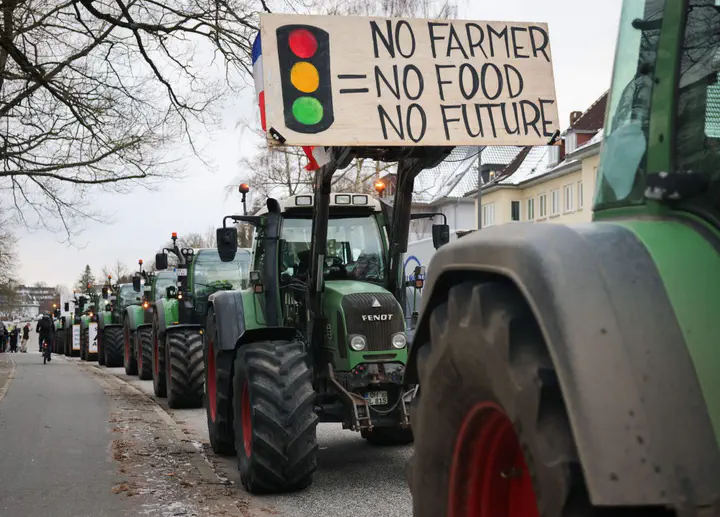Why EU Farmers Protests are Rippling Through Global Supply Chains 🚜🌾🚚

The War’s Harvest: Why EU Farmers are Protesting and What it Means for Global Supply Chains 🇺🇦🌾🚚
The image of tractors blocking major roads and angry farmers outside government buildings is becoming a familiar sight across the European Union. But this wave of protests goes beyond typical frustrations. The war in Ukraine has thrown a wrench into the delicate balance of the EU’s agricultural sector, fueling these demonstrations, and sending ripples through global supply chains.

Farmers with their tractors attend a protest in Pamplona, northern Spain, Friday, Feb. 9, 2024. Source: AP Photo
Understanding the Supply Chain Roots of EU Farmer Protests (with Added War Impact):
- Ukrainian Influx: The war has disrupted Ukraine’s agricultural production and exports. The EU’s move to ease import restrictions on Ukrainian goods, a show of solidarity, has some EU farmers worried about unfair competition from cheaper Ukrainian produce.
- Price Imbalance: Farmers argue they’re not getting a fair price for their products, a struggle further amplified by rising input costs due to the war and global economic uncertainty.
- Market Volatility: Global markets are already unpredictable, and the war in Ukraine has exacerbated this volatility. Price fluctuations for agricultural commodities leave farmers even more exposed, with income security hanging in the balance.
India’s Farmer Protests: A Different Story
While similar in spirit, farmer protests in India often center on different supply chain issues:
- Minimum Support Prices (MSPs): Indian farmers demand guaranteed minimum prices for crops, concerns not currently shared by most EU farmers.
- Market Access: Protests in India highlight the difficulties farmers face in accessing regulated markets and selling produce directly.
Navigating Protest-Driven Supply Chain Disruptions
How can supply chain managers mitigate the impact of farmer protests?
- Diversify Sourcing: Explore alternative suppliers and regions to reduce reliance on areas prone to protest-related disruptions.
- Enhance Visibility: Invest in real-time supply chain monitoring to identify potential bottlenecks and proactively reroute shipments.
- Build Relationships: Foster strong collaborative partnerships with farmers and suppliers based on fair practices and open communication.
Key Insights for Supply Chain Leaders
- Ethical Sourcing Matters: Consumers increasingly demand transparency and fair trade. Prioritize ethical practices in your supply chain, considering the impact on farmers globally.
- Risk Isn’t Static: Regularly reassess supply chain vulnerabilities, considering not just natural threats but also social and political instability, including the ongoing war’s impact.
- Agility is Key: The ability to rapidly adapt sourcing strategies and logistics will be vital in a world prone to disruption.
Let’s continue the conversation! How are the EU farmer protests impacting your supply chain? 🤔
#supplychain #logistics #agriculture #protest #EUSupplyChains #UkraineWar
References:
- Politico: https://www.politico.eu/article/milk-lakes-poor-revenues-european-union-farmers-fight-against-fallouts-free-market/
- Reuters: https://www.reuters.com/world/europe/angry-farmers-descend-brussels-take-protest-eu-summit-2024-02-01/
- Mintec Global: https://www.mintecglobal.com/top-stories/european-farmers-protests-making-noise-with-low-supply-chain-impact
- Euractiv: https://www.euractiv.com/section/agriculture-food/news/snapshot-of-farmers-protests-and-its-not-over/
- Food Manufacturing: https://www.foodmanufacturing.com/supply-chain/news/22886651/farmers-protest-over-european-union-policies-competition